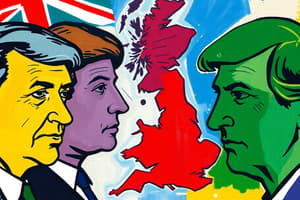Podcast
Questions and Answers
What proportion of British seats in the European Parliament did UKIP win?
What proportion of British seats in the European Parliament did UKIP win?
- 2/3
- 1/2
- 1/4
- 1/3 (correct)
Which party did UKIP gain their first MP from in the Commons?
Which party did UKIP gain their first MP from in the Commons?
- Labour
- Liberal Democrats
- Conservative (correct)
- Scottish National Party
What is one of the key positions of UKIP regarding the European Union?
What is one of the key positions of UKIP regarding the European Union?
- Expand immigration policies within the EU
- Withdraw from the EU and establish a free trade agreement (correct)
- Maintain full membership in the EU
- Increase financial contributions to the EU
Who has been the leader of UKIP since 2010?
Who has been the leader of UKIP since 2010?
In which part of the UK is UKIP most popular?
In which part of the UK is UKIP most popular?
What was a significant event for the Liberal Democrats in 1988?
What was a significant event for the Liberal Democrats in 1988?
Flashcards
Liberal Democrats (LibDems)
Liberal Democrats (LibDems)
A center-left political party in the UK, formed by the merger of the old Liberal Party and the Social Democratic Party in 1988. They are known for their moderate stance and have aimed to become a significant competitor to the two major parties, Labour and the Conservatives.
First-past-the-post system
First-past-the-post system
A political system where the candidate with the most votes in a constituency wins, regardless of the percentage of the vote they receive. This often leads to situations where parties that win a majority of the overall votes do not win a majority of seats in Parliament.
UK Independence Party (UKIP)
UK Independence Party (UKIP)
A political party in the UK that advocates for the UK to leave the European Union. They have gained significant support in recent years, particularly among those who feel that EU membership is detrimental to the UK.
Coalition Government
Coalition Government
Signup and view all the flashcards
Alternative Strategy
Alternative Strategy
Signup and view all the flashcards
What is UKIP?
What is UKIP?
Signup and view all the flashcards
What was UKIP's first breakthrough?
What was UKIP's first breakthrough?
Signup and view all the flashcards
How successful was UKIP in the European Parliament?
How successful was UKIP in the European Parliament?
Signup and view all the flashcards
Where is UKIP's support concentrated?
Where is UKIP's support concentrated?
Signup and view all the flashcards
Who is the leader of UKIP?
Who is the leader of UKIP?
Signup and view all the flashcards
Study Notes
British Political Parties
-
Liberal Democrats (LibDems):
- Formed in 1988 by merging the Liberal Party and the Social Democratic Party.
- Moderate center-left party, policies closer to Labour than Conservatives.
- Significant gains in the 2005 and 2010 elections, winning 23% of national votes and almost 10% of Commons seats.
- Limited by the first-past-the-post electoral system, which makes it difficult to gain majority representation.
- Strongest support in Scotland, also successful in parts of the West Country and Wales.
- Formed coalition government with the Conservatives in 2010 (after the 2010 election), with Nick Clegg as Deputy Prime Minister.
- Coalition's popularity weakened by the Conservative's restrictive economic policies.
-
UK Independence Party (UKIP):
- Newer party (founded 1993), focused primarily on opposition to EU membership.
- Surprising success in 2014 European Parliament elections (over 26% of the vote, winning 24 of 73 British seats).
- Significant result but limited support base (only about ⅓ of British voters).
- Won first seat in the House of Commons in 2014.
- Right-wing populist party advocating lower taxes, reduced public spending, EU withdrawal, and limited immigration.
- Strong support mostly in England, less prominent in other parts of the UK.
- Led by Nigel Farage from 2010 onwards.
-
Other Smaller Parties (in Parliament):
- Scottish National Party (SNP).
- Plaid Cymru (Welsh National Party).
- Northern Ireland Protestant and Catholic parties.
Studying That Suits You
Use AI to generate personalized quizzes and flashcards to suit your learning preferences.




